Presentations Fr. 22.06.2012 - Hosokawa Alpine Aktiengesellschaft
Presentations Fr. 22.06.2012 - Hosokawa Alpine Aktiengesellschaft
Presentations Fr. 22.06.2012 - Hosokawa Alpine Aktiengesellschaft
Create successful ePaper yourself
Turn your PDF publications into a flip-book with our unique Google optimized e-Paper software.
<strong>Hosokawa</strong> <strong>Alpine</strong>Expo 2012<br />
<strong>Presentations</strong> on <strong>Fr</strong>iday, 22 June (Page 2 of 4)<br />
<strong>Fr</strong>iday, 22 June: Lectures in Hall No. 1<br />
13:40<br />
–<br />
13:55<br />
14:00<br />
–<br />
14:30<br />
14:40<br />
–<br />
15:10<br />
15:15<br />
–<br />
15:35<br />
15:40<br />
–<br />
15:55<br />
16:00<br />
–<br />
16:30<br />
Continous improvement of energy efficiency<br />
Tobias Ruta, Endress+Hauser Messtechnik GmbH & Co. KG<br />
Accurate and reliable metering ensures the analysis of energy flows and assist in the Detectability of savings.<br />
Independent energy consultancy and realization of projects ensures the achievement of targets.<br />
Energy efficient, resource preservating processes and renewable materials – a nucleus for innovations in<br />
process engineering<br />
Prof. Dr.-Ing. Wolfgang Rommel, Head of Master Course Environmental and Process Technology of Augsburg<br />
University of Applied Sciences, Managing Director of bifa Environmental Institute, Augsburg<br />
The world-wide demographic development combined with increasing standards of life caused an exponentially<br />
increase of natural resource consumption. The ecological limits of quantitative growth have been reached! In<br />
general, that means that the resource intensity and efficiency have to be dramatically increased. This is due for<br />
almost all production processes. Mechanical and comminution processes play a very important role in feed stock<br />
and raw material exploitation, material production and processing as well as in recycling processes. On one hand,<br />
these processes are rather energy consuming and on the other hand they are part of the material supply chain and<br />
thus determine the material efficiency significantly. Hence, major task in process engineering is to increase the<br />
degree of efficiency of comminution and material handling operations. Certainly, this is a big challenge, but it also<br />
offers a lot of options and thus will be the nucleus for innovations in process engineering.<br />
This lecture will give some selected samples:<br />
� preparation and processing of biomass for bio-degradable plastics, solid and liquid bio fuel<br />
� separation of material composites<br />
� crushing of carbon-fiber-composite parts as a pre-step for pyrolysis recycling<br />
Fine particle processing and Energy saving – a contradiction?<br />
Dr. Jürgen Stein, <strong>Hosokawa</strong> <strong>Alpine</strong> AG, Technical Division<br />
Actual discussions about energy saving in all areas of life and industry marks fine particle processes due to the low<br />
efficiency as archaic. To increase the efficiency a new approach is necessary. In principle three areas can be<br />
defined to optimize a fine particle processing system: machine technology, process control and product properties.<br />
A significant energy reduction can be reached by intelligent linking of all these aspects and parameters.<br />
Fine particle processing and Energy saving by intelligent process control<br />
Gerhard Kiederle, <strong>Hosokawa</strong> <strong>Alpine</strong> AG, Technical Division<br />
A key to increase the energy efficiency of a fine particle process is an intelligent process control. For intelligent<br />
process controls a lot of theoretical approaches are on the market. Most tend to be complicated. <strong>Hosokawa</strong> <strong>Alpine</strong><br />
developed a practical solution, which allows an intelligent control of a fine particle process with a manageable<br />
effort.<br />
Fine particle processing and Energy saving by inline particle size measurement<br />
Hans Kaiser, <strong>Hosokawa</strong> <strong>Alpine</strong> AG, Technical Division<br />
Intelligent measurement systems help to increase the understanding of powder production processes. One of<br />
these systems is an inline particle measurement. How this knowledge can be used to optimize a powder process is<br />
shown on different case studies.<br />
Efficiency in flue gas cleaning with NaHCO3 by activation by grinding<br />
Dr. Bernd Morun, DrySoTec GmbH<br />
Long term experience with: -dependency of activity from the grade of grinding; - particle uniformity after grinding;<br />
-maintenance and problems gained in practice.<br />
M<br />
C<br />
F<br />
R<br />
M<br />
C<br />
F<br />
R<br />
M<br />
C<br />
P<br />
F<br />
M<br />
C<br />
P<br />
F<br />
M<br />
C<br />
P<br />
F<br />
C






